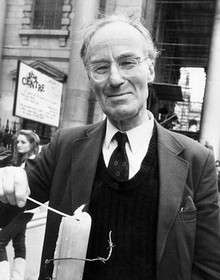Peter Benenson
Peter Benenson (31 July 1921 – 25 February 2005) was a British lawyer, human rights activist and the founder of human rights group Amnesty International (AI). Benenson refused all honours but in his 80s, largely to please his family, he accepted the Pride of Britain Award for Lifetime Achievement in 2001.[3]
Peter Benenson | |
|---|---|
 Benenson lighting a candle in 1991 | |
| Born | Peter James Henry Solomon 31 July 1921 London, England |
| Died | 25 February 2005 (aged 83) Oxford, England |
| Resting place | Nuneham Courtenay graveyard |
| Nationality | British |
| Known for | Founding the global human rights organisation Amnesty International |
| Spouse(s) | Margaret Anderson (?–1972; divorced; 2 children) Susan Booth (1973[1]–2005; his death; 2 children)[2] |
| Parent(s) | Flora Benenson Harold Solomon |
Early life
He was born in London as Peter James Henry Solomon, to a large Jewish family,[4] the only son of British-born Harold Solomon and Russian-born Flora Benenson; Peter Benenson adopted his mother's maiden name later in life. His army officer father died from a long-term injury when Benenson was aged nine, and he was tutored privately by W. H. Auden before going to Eton. At the age of sixteen, he helped to establish a relief fund with other schoolboys for children orphaned by the Spanish Civil War. He took his mother's maiden name of Benenson as a tribute to his grandfather, the Russian gold tycoon Grigori Benenson, following his grandfather's death.
He enrolled for study at Balliol College, Oxford but World War II interrupted his education. He served in the Intelligence Corps at the Ministry of Information where he met his first wife, Margaret Anderson. He worked at Bletchley Park during World War II in the Testery. He is listed as RSM Benenson in room 41 as a cryptographer.[5]
Career
After demobilisation in 1946, Benenson began practising as a barrister before joining the Labour Party and standing unsuccessfully for election at Streatham in 1950 and for North Herts constituency till 1959. He was one of a group of British lawyers who, in 1957, founded JUSTICE, the UK-based human rights and law reform organisation. In 1958, he fell ill and moved to Italy to convalesce. In the same year, he converted to the Roman Catholic Church.
Activism
Benenson claimed to have been shocked and angered by a newspaper report of two Portuguese students from Coimbra sentenced to seven years in prison for raising their glasses in a toast to freedom during the regime of António de Oliveira Salazar, though this story has been shown to be a myth.[6]. At this time, Portugal was ruled by the authoritarian Estado Novo regime, and anti-regime conspiracies were vigorously repressed by the Portuguese state police and deemed anti-Portuguese. He wrote to David Astor, editor of The Observer. On 28 May 1961, Benenson's article, entitled "The Forgotten Prisoners", was published. The letter asked readers to write letters showing support for all those imprisoned for their political or religious beliefs. To co-ordinate such letter-writing campaigns, Amnesty International was founded in London in July 1961 at a meeting of Benenson and six other men, who included a Conservative, a Liberal and a Labour MP.[7][8] The response was so overwhelming that within a year various groups of letter-writers had formed in more than a dozen countries.
Amnesty International
Initially appointed general secretary of AI, Benenson stood down in 1964 owing to ill health. By 1966, Amnesty International faced an internal crisis. The advisory position of president of the International Executive was then created for him. In 1966, after a report of British use of torture in Yemen, he began to make allegations that the British government had infiltrated the governance of AI.[9] An inquiry was set up which reported at Elsinore in Denmark in 1967. The allegations were rejected and Benenson resigned from AI.
While never again active in the organisation, Benenson was later personally reconciled with other executives, including Seán MacBride.
Personal life
Marriage to his first wife Margaret Anderson ended in divorce in 1972. He married Susan Booth in 1973. They had two children and were married until his death in 2005.[10][11]
Death
He died of pneumonia on 25 February 2005 at the John Radcliffe Hospital, Oxford, aged 83, having been a resident of the nearby village of Nuneham Courtenay where he was buried.[12]
References
- "Peter Benenson". benensonsociety.org.
- Philip Steele (2011). Activists (20th century lives). ISBN 978-1-44-883292-7.
- "Lifetime Achievement, Peter Benenson, Founder of Amnesty International". Pride of Britain Awards. Archived from the original on 7 September 2012.
- "Peter Benenson hero file". Moreorless : Heroes and killers of the 20th century. Archived from the original on 18 February 2006.
- COLOSSUS B.Jack Copeland and others. Page 253. Oxford University Press. Paperback edition 2010.
- "The "Toast to Freedom" That Led to Amnesty International". Huffington Post.
- Tracy McVeigh (29 May 2012). "Amnesty International marks 50 years of fighting for free speech". The Observer.
- Childs, Peter; Storry, Mike, eds. (2002). "Amnesty International". Encyclopedia of Contemporary British Culture. London: Routledge. pp. 22–23.
- Clark, Ann Marie (2010). Diplomacy of Conscience: Amnesty International and Changing Human Rights Norms. Princeton, New Jersey: Princeton UP. p. 15. ISBN 1400814189.
- "Peter Benenson". benensonsociety.org.
- Philip Steele (2011). Activists (20th century lives). ISBN 978-1-44-883292-7.
- McFadden, Robert D. (28 February 2005). "Peter Benenson, Founder of Amnesty Group, Dies at 83". The New York Times.
Sources
- Pincock, S.: Peter James Henry Solomon Benenson (obituary). Lancet, 2 April 2005; 365: 1224.
External links
| Wikiquote has quotations related to: Peter Benenson |
| Non-profit organization positions | ||
|---|---|---|
| Preceded by None |
President of Amnesty International 1961–1966 |
Succeeded by Eric Baker |